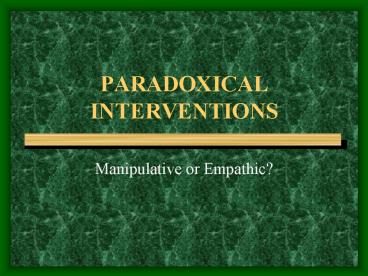PARADOXICAL INTERVENTIONS - PowerPoint PPT Presentation
1 / 11
Title:
PARADOXICAL INTERVENTIONS
Description:
Reinforcing the arguments conducive to positive change Indications Phobias and obsessions Tics Jealousy Headaches Temper tantrums Anorexic or Schizophrenic ... – PowerPoint PPT presentation
Number of Views:309
Avg rating:3.0/5.0
Title: PARADOXICAL INTERVENTIONS
1
PARADOXICAL INTERVENTIONS
- Manipulative or Empathic?
2
- Menos de lo mismo
- Sugerencias y directivas
- Tareas
- Excepciones
- Escalas
- Pregunta del milagro
- Enfoque en el futuro
- Desenmarcado y Reenmarcado cognitivo
- Intervención en pautas de comportamiento
- Analogía
- Paradoja
- Intervenciones Estructurales Familiares
- Uso de Genogramas
3
What are they?
- One communication inserted in another framing
communication that contradicts the first one,
bringing forth a cognitive / emotional /
behavioral dilemma - To comply with one, you have to disobey the other
one - They are also interventions that, with the intent
to help, contain an explicit message of worsening
or continuing on with the symptom
4
What's the logic?
- It puts forth to the client the dilemma of
voluntary behaving in a way that is thought to be
involuntary for him - It induces insight to the personal function of
the symptom and its secondary gains - The client can now Take control of the symptom
5
Types
- Based on obedience A continuation or increase of
the symptom is asked for directly (Low
opposition, external locus of control) - Based on defiance It is anticipated that the
client will defy the therapist's request
renouncing then, to the symptomatic behavior
(High opposition, internal locus of control)
6
Classification
- Prescription Prescribing the symptom
- Restriction Discouraging change, or denying the
possibility that it can happen - Positioning Taking on a position of
pseudocomprehension about the client's problem,
usually exaggerating it (see argument
colonization)
7
Argument Colonization
- Empathically taking hold of the arguments against
change (without lying). - Letting the client suggest their own arguments
(Yes, but...) - Reinforcing the arguments conducive to positive
change
8
Indications
- Phobias and obsessions
- Tics
- Jealousy
- Headaches
- Temper tantrums
- Anorexic or Schizophrenic Families
9
Contraindications
- Families that are responsible and open to change
- Families with little structure
- Immature families searching for parental figures
- Impulsive and hostile families
- People not involved in therapy
- Paranoids
- Potentially destructive
10
Ethical matters
- CRITICISMS
- Manipulative
- Controlling
- Dishonest
- Potentially dangerous
- DEFFENSES
- In every intervention there is a manipulation
- Instead of ignoring this manipulation, we are
using it for the client's benefit - Patients usually allocate their benefits within
themselves - There haven't been any reports where this
techniques have worsened a client's condition
11
THE END































